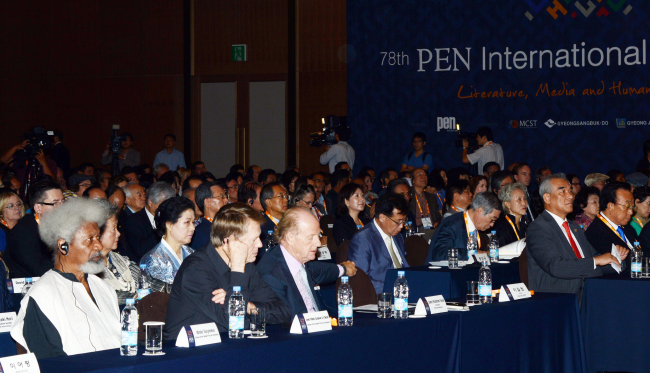Literary forum discusses issues concerning media and human rights with Nobel laureates
GYEONGJU, North Gyeongsang Province ― The 78th International PEN Congress opened on Monday in Gyeongju, North Gyeongsang Province, kicking off a seven-day event focusing on issues of media, literature and human rights.
A London-based international association of writers, PEN International has been hosting the congress, which consists of networking and literary events and lectures, in different cities around the world. The literary bash has been held in Korea twice before ― in 1970 and 1988, both times in Seoul.
John Ralston Saul, President of PEN International, shared why the organization chose Gyeongju ― which served as the capital of the ancient kingdom of Silla (B.C. 57 ― A.D. 935) ― for this year’s edition. He stressed that the PEN International’s force comes from its independence from politics, as well as its determination to protect the freedom of expression.
 |
Nobel Prize winners in literature, Wole Soyinka (far left) and Jean-Marie Gustave Le Clezio (second from left), along with Minister of Culture, Sports and Tourism Choe Kwang-shik (second from right) attend the opening ceremony of the 78th International PEN Congress at Hotel Hyundai in Gyeongju, North Gyeongsang Province, Monday. (Yonhap News) |
“Why Gyeongju? Not so much because it is the historic capital of several early Korean kingdoms,” he said during his opening address at the ceremony.
“More because six centuries ago this was one of the birthplaces of ideas and attitudes that sit well with the principles of PEN. Gyeongju is known as the home of what could be called ‘Humanist Confucianism’: the conviction that we exist because others are able to exist; that nature and human are one. That Korean approach to Confucian ethics at their highest is of great importance.”
Addressing this year’s themes ― literature, media and human rights ― Saul said the congress will deal with “difficult” issues.
“We will try to put in place ethical standards for the digital world which increasingly shapes how literature can be brought to the public and how free expression will function,” he said.
“We are also focusing with increasing expertise on how to support languages with smaller populations, often languages surviving with difficulty under political pressure. And we are rethinking how writers can play a role in places of conflict.”
Saul also addressed the issues of human rights, mentioning PEN International member-writers who are currently imprisoned for their works.
“We will focus again, as we always have, on our members in jail ― Liu Xiaobo in China and Eskinder Nega in Ethiopia come to mind,” he said.
“And we are creating new strategies to support our members and colleagues suffering in places like Syria; dying in places like Honduras, Mexico and Brazil.”
Lee Gil-won, president of PEN International Korean Center, mentioned the human rights situation in North Korea.
“South Korea achieved rapid economic success through democracy and is now proud to host international congresses like this one that focuses on human rights,” Lee said.
“In the North, however, which is controlled by a military dictatorship, people are deprived of their basic human rights and many writers are imprisoned or even killed for their justified, but nevertheless unpleasant writings against the regime.”
During the congress, a group of writers who have defected from North Korea are expected to join PEN International and open their own PEN center. There are currently 143 PEN centers around the world in 114 different countries.
Two Nobel Prize winners, Wole Soyinka and Jean-Marie Gustave Le Clezio, are attending this year’s edition. Turkish novelist and Nobel Prize winner Orhan Pamuk, who had been invited as well, is not participating due to personal reasons, the PEN International Korean Center said.
By Claire Lee (
dyc@heraldcorp.com)








